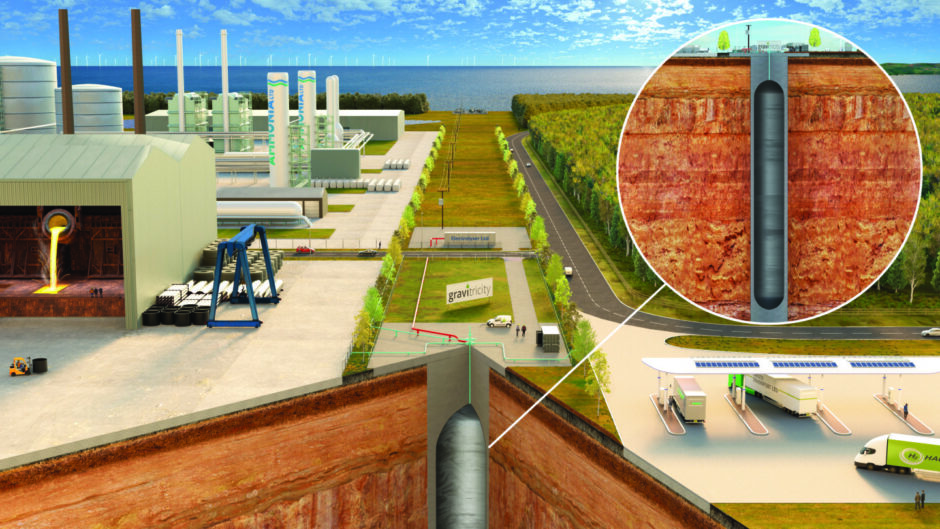
Plans are in the offing to develop hundreds of purpose-built underground hydrogen stores that could help to fuel the UK’s green future.
Edinburgh-based energy storage specialists Gravitricity has signed a memorandum of understanding (MoU) with infrastructure major VSL Systems UK.
Together the pair will complete the design of the purpose-built underground lined rock shafts, which could be rolled out nationwide.
They plan to build a scale demonstrator in the next two years, ahead of full-scale commercial deployment.
VSL is part of the French Bouygues Construction group, and is a specialist contractor for the construction, preservation and repair of major engineered structures and infrastructure.
Meanwhile, Gravitricity is developing below ground, gravity energy storage systems in the UK and mainland Europe.
The company has described its technology – known as FlexiStore – as a ‘goldilocks’ solution to the future challenge of green hydrogen storage.
According to Gravitricity, it offers a system that is “larger and more secure” than above ground hydrogen storage, and more flexible than subterranean salt caverns, the two most commonly-proposed solutions.
Charlie Blair, the firm’s managing director, said: “Green hydrogen will be a vital fuel of the future in industrial applications and in heavy transport, where electrification is just not feasible, or where industrial grey hydrogen is already used.
“Purpose-built lined rock shafts will be the safest and most affordable way to store large volumes of hydrogen near to where it will be required. It is difficult to transport hydrogen. It therefore makes sense to locate hydrogen storage systems close to sources of renewable power – which can generate green hydrogen – and to potential users.
“At present, the main proposals for storage are underground salt caverns and above ground storage. Salt caverns offer scale, but very little flexibility – they only exist in certain locations; whilst above ground systems lack scale.
“We believe we have a ‘Goldilocks’ solution which can be delivered safely and affordably to meet the growing hydrogen economy’s needs.”
Each proposed rock shaft will be six metres in diameter, 365 metres deep and lined with steel.
A single store is capable of holding up to 100 tonnes of green hydrogen, enough to refuel more than 1000 heavy-goods-vehicles, or to power 500 buses for a week.
According to analysis carried out by Gravitricity, the construction of just 1000 FlexiStores would meet a quarter of the UK Government’s predicted 2050 hydrogen storage needs.
Notably, the stores aren’t reliant on specific rock formations, meaning they can be built near to green hydrogen production facilities.
A single FlexiStore would store the green hydrogen generated by a 460 megawatt (MW) offshore wind farm, and could be emptied and refilled daily.
Multiple stores could soak up vast amounts of wind energy that would otherwise be wasted when demand is low or the grid is at full capacity.
In 2020, the total amount of ‘constrained’ wind in the UK totalled 3.6 terawatt hours (TWh).
Gravitricity is currently in talks with Cumbrian steel specialists Bendalls Engineering to fabricate the linings for the rock shafts, and is also on the hunt for cash to build its first scale demonstrator project.
Once complete, the firm plans to rollout hundreds of purpose-built green hydrogen FlexiStores across the UK.
Commenting on the MoU, Peter Hughes, managing director of VSL UK said: “VSL is delighted to partner with Gravitricity to develop and deliver these pioneering ground engineering solutions for renewable energy generation and storage. This project is fully aligned with the VSL vision to focus our engineering capabilities and solutions on the global transition to a low carbon future.”
The UK Government has highlighted a number of electrolytic hydrogen projects across the UK that will require hydrogen storage alongside renewable powered electrolysers.
Gravitricity has already earmarked a number of sites for the pilot project, and is in discussion with land owners, including utilities, regarding the pilot project and future commercial schemes.
Gravitricity recently completed a £300,000 feasibility study, conducted with ARUP, which showed it is technically and commercially feasible to store large amounts of compressed hydrogen in an underground lined rock shaft.
Mr Blair added: “If green hydrogen is to become a mass market fuel of the future then we need to find ways to store it safely and in large quantities close to where it is needed.”
Recommended for you


 © Supplied by Gravitricity
© Supplied by Gravitricity